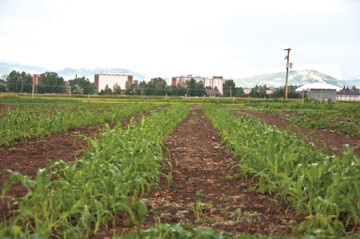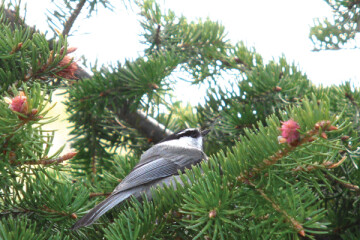Towne’s Harvest Garden
Community Agriculture and Beyond
Towne’s Harvest Garden, part of the MSU Campus Farm, is an educational vegetable haven. I strolled onto the plot of land alongside Kara Landolfi, Marketing Manager of THG, and my eyes scanned the three certified organic acres of garden beds, fertile homes to a wide array of produce. Checking out row after row of vegetables, flanked by the hops garden nestled nearby and a far-off field occupied by graduate students’ research projects on melons and other crops, we strode along the neat rows on a windy afternoon.
Meandering among fledgling plants in early summer, from lettuces to squash to herbs, Kara explains that THG started as a result of student interest. The garden began in 2007 as a means to provide locally-grown food to families through the Gallatin Valley Food Bank. It then evolved into the blossoming operation it is today – rich with growing and selling, teaching and learning, research and community outreach. A lot goes on at THG – so much that Kara herself can not keep up! This year, Towne’s Harvest Garden was recognized by the Association of Public and Land-Grant Universities as one of ten exemplary outreach programs in the country.
THG is a product – perhaps the most visible, pervasive and progressive aspect – of the MSU Friends of Local Foods Student Organization. The Garden is inextricably linked with the Sustainable Food and Bioenergy Systems (SFBS) program at MSU and, during the growing season, relies heavily upon their CSA program (which provides students with a bag of produce for $5/week) and their community food truck/mobile market. They also have a campus farm stand for students during the growing season. All of this increases and encourages interest in healthy local produce. It is important that the MSU community helps support the farm, as this is vital in allowing the farm to continue to educate students. With these key sources as a solid foundation for their stability, THG serves primarily to educate. Though the farm is most closely tied to the SFBS program, its opportunities draw students from a wide array of disciplines. Most students in the program have no prior farming experience. While other farms in the valley offer more intensive internships, THG’s is threaded through MSU’s SFBS program.
This is an essential element because THG can reach a greater audience and an entire student body – individuals working toward degrees who are very involved with and interested in food-related careers. Kara herself earned her undergraduate degree in SFBS, completed a practicum at THG during a summer, and upon graduation this past spring, started her role as Marketing Manager – through which she spreads her passion for their work. The educational aspect of the farm is tailored mainly to students, but also fosters the learning and growth of all people who want to gain knowledge and become involved in agriculture, sustainability and community food systems. There are so many ways to make these ideals a part of our lives and our careers – for those of us who choose that path. The key is finding the right niche so we can all be pieces of the puzzle and live healthier, more sustainable and interconnected lives.
Perhaps the most important thing I took away from my chat with Kara on the farm was that awareness is key. It is crucial for those who know and love THG – for its educational - and health-driven purpose, and for its dedication to involvement – to spread the word about this unique organization. Kara and her team want the Bozeman community to know about the farm, their work, and their pursuits – bridging farming, community, sustainability, and education for the health of planet Earth and its ever-learning inhabitants.
Towne’s Harvest Garden benefits not only students, but the community and beyond. The farm began and exists to teach and to provide people in the valley with locally-grown food in hopes of involving many more in this endeavor – this endeavor to change the way we grow, think about, and relate to our food that many of us share. The goal of most sustainable farms is to utilize our earth’s resources kindly and to make home-grown food a reality for everyone. But THG’s seemingly local goals have greater implications and reach much further than Main Street. Many students complete internship experiences on the farm and receive their degrees in SFBS. Some have gone on to farm and further benefit our community and other communities. The owners of Running Strike Farm, to name just one, are graduates of the SFBS program. Other graduates have also started farms or pursued other occupations and initiated ideas and programs of their own – teaching more people still, passing it on and on…
I continued to walk around the farm, surrounded by hops and other crops, arranged neatly and many just beginning to sprout on this late June day, still the beginning of the season. I thought about our food system and the idea that we really are still in the embryonic stages of a revolution. I waver across the line dividing my “depressing and pessimistic outlook” on the state of the world and my excitement about change; my hope. I decide the latter is the only path that will get anybody anywhere – the path of mental strength and fortitude, the path of most resistance. We are all in this together and this small, purpose-driven farm in Bozeman, Montana is just one piece, just a few people of many who are passionate about healthy food and a healthier coexistence.
Kara and I turned and headed back down the earthy aisle away from the field, as we rounded the chicken pen we were quickly interrupted by a game of catch – catch the runaway chickens, that is. We ended our chat chasing chickens who did not want to be caught around the lawn in front of the office. We’d spotted them escaping their enclosure, but it was too late. They were scuttling around the grass, pecking and picking at things that chickens peck and pick at, enjoying themselves. With little help from me Kara managed to utilize her impressive herding skills and corral them back across the opening in the wire fencing, shutting it hastily behind their feathery behinds. “Well!” Kara exclaimed grinning, “that was some excitement to end your visit with.” And it was. It was the perfect note on which to end a thought-provoking afternoon. The chickens brought life and breathed reality into all we’d just been discussing. It had been awhile since I’d worked with chickens, and I’d just at that moment been reminded of my love and intrigue for farming in all of its realms.

